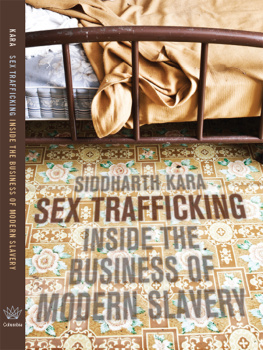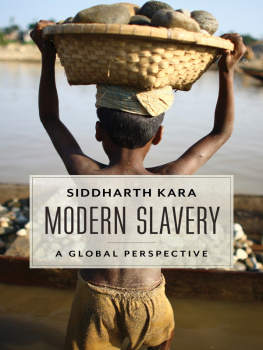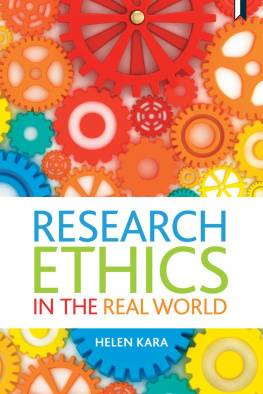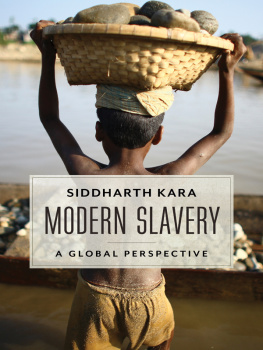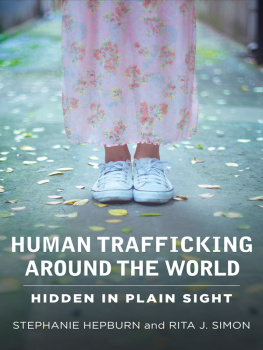SEX TRAFFICKING
Praise for Sex Trafficking
Siddharth Kara possesses that rare and valuable combination of passion for his subject, insight, and rigorous research. His analysis is persuasive and his descriptions heartbreaking in their clarity. Human trafficking in all forms is slavery, no matter how you cut it, and in this book Kara brings a modern-day scourge to the light of day.
ERICA STONE, PRESIDENT, AMERICAN HIMALAYAN FOUNDATION
A disturbing and illuminating study. IRISH TIMES
I approached this book with a certain weariness. Having worked on the subject of sex trafficking for many years, I was unenthusiastic about yet another expos or cri de coeur from a business executive turned antislavery advocate. I could not have been more wrong. This is a unique and inspiring bookan honest, lucid, and immensely intelligent account of a devastating yet pervasive aspect of contemporary globalization. It deserves to be widely read by anyone who wants to understand one of the most persistent and complex human rights violations of our times.
JACQUELINE BHABHA, HARVARD LAW SCHOOL
An impressive, scholarly book that will prove an asset for the global anti-trafficking movement in the next decade.
STANFORD SOCIAL INNOVATION REVIEW
As an experienced investigator of human trafficking offences, I was not expecting to discover anything new from this book. The reality was the oppositethis book offers unique and invaluable insight into the whole subject of human trafficking. The global financial perspective was especially helpful, and I have found the analysis and recommendations extremely useful in my work as an investigator and policy adviser. I strongly recommend it to others involved in the fight against human trafficking.
STEPHEN WILKINSON, SENIOR INVESTIGATING OFFICER ON HUMAN TRAFFICKING, UNITED KINGDOM
This book could not be more important. After years of witnessing slavery and meeting with slaves, Siddharth Kara illuminates one of our most pressing human rights issues. He offers brand-new research and reliable facts, shattering the myths and sensationalism that tend to surround this topic. Everyone should read this book: it will change the way we think about our world.
ZOE TRODD, HARVARD UNIVERSITY
SEX TRAFFICKING
Inside the Business of Modern Slavery
Siddharth Kara
Columbia University Press New York

Columbia University Press
Publishers Since 1893
New York Chichester, West Sussex
cup.columbia.edu
Copyright 2009 Siddharth Ashok Kara
Paperback edition, 2010
All rights reserved
E-ISBN 978-0-231-51139-1
A Caravan book. For more information, visit
www.caravanbooks.org.
Library of Congress Cataloging-in-Publication Data
Kara, Siddharth.
Sex trafficking : inside the business of modern slavery / Siddharth Kara.
p. cm.
Includes bibliographical references and index.
ISBN 978-0-231-13960-1 (cloth : alk. paper)
ISBN 978-0-231-13961-8 (pbk. : alk. paper)
ISBN 978-0-231-51139-1 (e-book)
1. Human trafficking. 2. Human
traffickingPrevention. 3. MinoritiesCrimes
against. 4. MinoritiesSocial conditions.
5. MinoritiesEconomic conditions.
6. GlobalizationEconomic conditions.
7. Prostitution. 8. Slavery. 9. Sex-oriented
businesses. I. Title.
HQ281.K37 2009
364.15dc22
2008021988
A Columbia University Press E-book.
CUP would be pleased to hear about your readingexperience with this e-book at .
References to Internet Web sites (URLs) were accurate at the time of writing. Neither the author nor Columbia University Press is responsible for URLs that may have expired or changed since the manuscript was prepared.
Their vessels now had made th intended land,
And all with joy descend upon the strand;
When the false tyrant seiz'd the princely maid,
And to a lodge in distant woods convey'd;
Pale, sinking, and distress'd with jealous fears,
And asking for her sister all in tears.
The letcher, for enjoyment fully bent,
No longer now conceal'd his base intent;
But with rude haste the bloomy girl deflow'rd,
Tender, defenceless, and with ease o'erpower'd.
Her piercing accents to her sire complain,
And to her absent sister, but in vain:
In vain she importunes, with doleful cries,
Each unattentive godhead of the skies.
Ovid, Metamorphoses
Contents
After my third research trip into the global sex trafficking industry, I brooded for twenty-four hours on a flight from Mumbai to Los Angeles, wondering how to write this book. Countless faces of torture, savagery, and abject slavery swirled in my mind. I did not know how I would convey these stories; I knew only that the truths of the scores of sex slaves I met in brothels, massage parlors, street corners, and apartments across the world must be told, however unpalatable those truths may be. Though I originally intended this book as a systematic narration of my journey into the sex trafficking industry, a much broader intention began to form in my mind. I realized I wanted to recount a life-altering journey, one that motivated in me a newfound mission to contribute to more successful international efforts to abolish sex trafficking and all other forms of contemporary slavery.
That slavery still exists may surprise some readers, but the practice of violently coerced labor continues to thrive in every corner of the globe. There were 28.4 million slaves in the world at the end of 2006, and there will most likely be a greater number by the time you read this book (see are bonded laborers in South Asia, Latin America, and Africa, who accrue or inherit debts that can never be repaid, no matter how long they work. Slaves in the United States harvest agricultural products: onions, avocados, and corn in Texas, California, Florida, and the Carolinas. Up to 5 percent of the world's cocoa beans are picked by slave hands in the Ivory Coast. Slaves continue to harvest coffee in Kenya and Ethiopia, and they burn wood in hellish furnaces in Brazil to produce charcoal that is used to temper the steel in everything from garden shears to car axles. Approximately 1.2 million of these 28.4 million slaves are young women and children, who were deceived, abducted, seduced, or sold by families to be prostituted across the globe. These sex slaves are forced to service hundreds, often thousands of men before they are discarded, forming the backbone of one of the most profitable illicit enterprises in the world. Drug trafficking generates greater dollar revenues, but trafficked women are far more profitable. Unlike a drug, a human female does not have to be grown, cultivated, distilled, or packaged. Unlike a drug, a human female can be used by the customer again and again.
The brutalities associated with sex slavery are perverse, violent, and utterly destructive. Whips, cigarette burns, broken bones, starvationevery slave has suffered these tortures, but sex slaves suffer each of these as well as innumerable counts of rape - ten, fifteen, twenty or more times per day. In brothels across the globe, I met women and children who suffered unspeakable acts of barbarity. Meeting these victims was not easy. With each interview, I became increasingly filled with heartbreak, sorrow, and rage. Nothing I write can possibly convey the sensation of peering into the moribund eyes of a broken child who has been forced to have sex with hundreds of men before the age of sixteen.
I am often asked how I first became interested in the topic of sex trafficking. The seeds of my research were sown years ago when I was an undergraduate at Duke University. A story on CNN spotlighted a young Croatian girl, fourteen years old, from a well-to-do family in Zagreb. She was breaking swimming records across Europe and intended to swim for Croatia in the 1996 Summer Olympics in Atlanta. Hopes were high that she would bring home more than one gold medal to the fledgling country. One night, as she slept, a bomb sent shrapnel flying into her bedroom, shattering her legs. She would never swim again.
Next page
